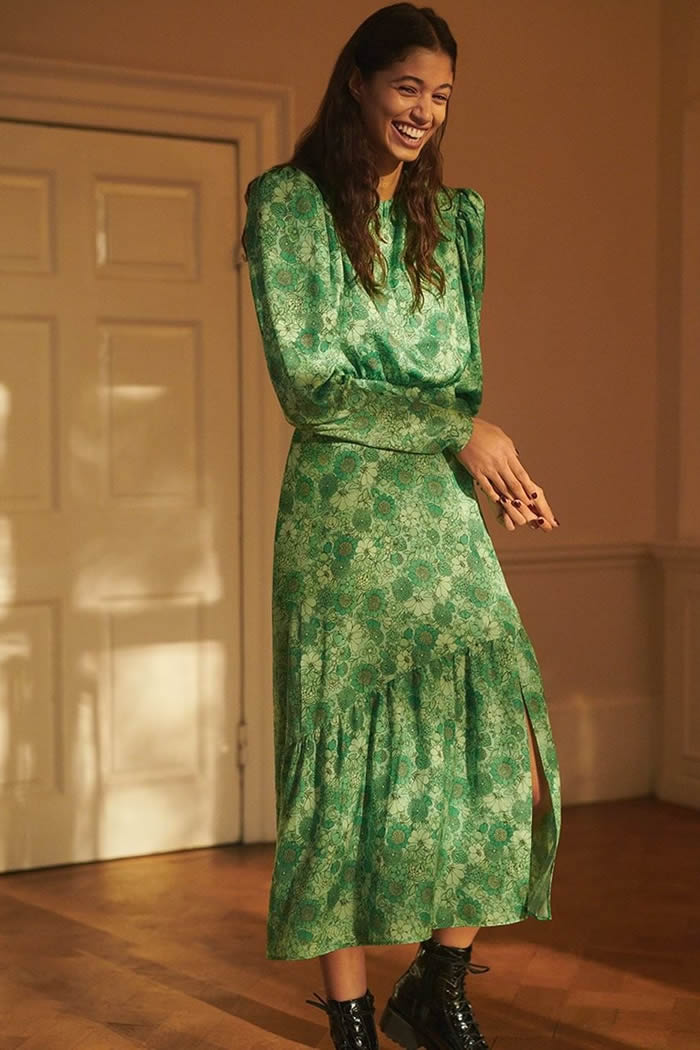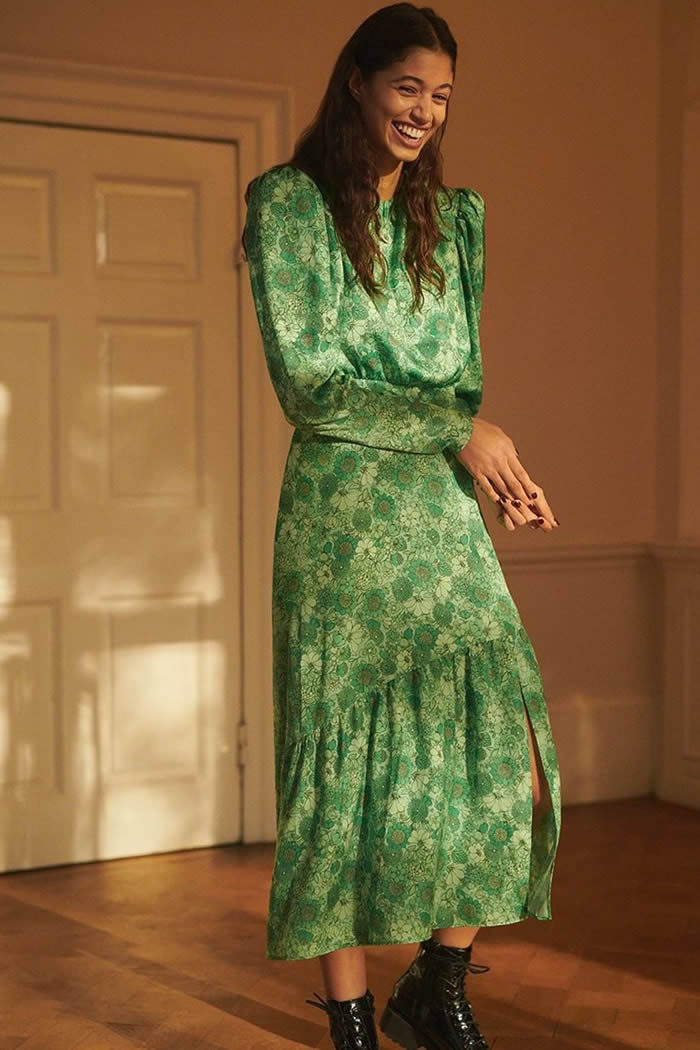Topshop’s troubled parent Arcadia Group, owner of eight retail brands, has filed for bankruptcy in the U.K., marking the end of an era for its colorful, and controversial, owner Sir Philip Green, leaving an estimated pension deficit of 350 million pounds and about 13,000 jobs at risk.
Late Monday Arcadia confirmed that Matt Smith and Dan Butters, together with other restructuring partners at Deloitte, had been appointed as joint administrators to the group companies as part of a “trading administration.”
The group, which operates from about 444 leased sites in the U.K. and 22 overseas, employs 13,000 people. A total of 9,294 employees are on furlough, and no redundancies are being announced at the moment, the group said. The stores will open, as usual, once lockdown in England eases on Dec. 2.
The administrators are “assessing all options available to the group and will be honoring all online orders made over the Black Friday weekend and will continue to be operating all the existing sale channels of the business.”
Ian Grabiner, chief executive officer of Arcadia, said, “This is an incredibly sad day for all of our colleagues as well as our suppliers and our many other stakeholders.
“The impact of the COVID-19 pandemic, including the forced closure of our stores for prolonged periods, has severely impacted on trading across all of our brands. Throughout this immensely challenging time our priority has been to protect jobs and preserve the financial stability of the group in the hope that we could ride out the pandemic and come out fighting on the other side. Ultimately, however, in the face of the most difficult trading conditions we have ever experienced, the obstacles we encountered were far too severe.
“Our priority now is to work closely with the administrators to deliver the best possible outcome for all our stakeholders, in particular our hard-working employees across the group. Throughout this process, trading will continue across all of our brands. Our stores will remain open, or reopen when permitted under the government COVID-19 restrictions, our online platforms will be fully operational and supplies to all of our partners will continue.”
COVID-19 made an already bad situation worse: earlier this year, along with many other retailers, Arcadia slashed bosses’ paychecks by up to 50 percent, “significantly reduced” head office staff and furloughed a “substantial” number of employees who were unable to work due to shop closures.
Smith, of Deloitte, said “Arcadia sits at the heart of the high street, and has been striving to combat the impact of COVID-19 throughout this year. Now the effect of the lockdowns, combined with broader challenges facing brick-and-mortar retailers, have resulted in a critical funding requirement for the group and today’s administration.
“We will now work with the existing management team and broader stakeholders to assess all options available for the future of the group’s businesses. It is our intention to continue to trade all of the brands, and we look forward to welcoming customers back into stores when many of them are allowed to reopen.

“We will be rapidly seeking expressions of interest and expect to identify one or more buyers to ensure the future success of the businesses. As administrators we’d like to thank all of the group’s employees, customers and business partners for their support, at what we appreciate is a difficult time.”
As reported, the company had been teetering on the edge of bankruptcy and had been expected to call in administrators from Deloitte this week.
Green’s company, which he purchased in 2002 for 850 million pounds, was already in the thick of a restructuring program that had forced it to shutter stores and lay off staff. In June 2019, Arcadia had narrowly avoided bankruptcy after its creditors agreed to back a cost-cutting plan put forward by the retailer.
Adding to Arcadia’s perfect storm was the downsizing of the department store Debenhams, which fell into administration earlier this year and is now being run by a consortium of lenders. Arcadia was the largest concession holder at Debenhams stores, which has seen many of its stores go dark and operations outside the U.K. shut down.
Online giants, such as Boohoo, and retailers including Mike Ashley, owner of Frasers Group, are expected to be among the bidders for Arcadia’s companies, which include Topshop, Topman, Dorothy Perkins, Evans, Wallis and Burton.
A number of question marks hang over the future of the group, and the largest of those is the pension fund gap, which Sky News estimates to be in the region of 350 million pounds.
That hole could potentially be plugged by the sale of Arcadia’s retail property or brands, or by Green himself. He’s certainly been down that road before, having written a 363 million pound check to fill the pensions gap at his former company, Bhs, in 2017.
Many factors are responsible for the demise of Arcadia, from macro trends to the behavior of Green himself.
According to Nina Marston, fashion and luxury analyst at Euromonitor, COVID-19 may have been responsible for Arcadia’s death blow, but changing consumer tastes and habits played a major role.
“COVID-19 has resulted in a Darwinian shakeout for midpriced retailers on the British high street, causing an expected value decline of 18 percent for the U.K. apparel and footwear market and a value decline of 40 percent for Arcadia Group,” she said, quoting figures that will be published by Euromonitor in mid-December.
She argued that even before the pandemic devastated the industry, “consumer spending on apparel and footwear had been decelerating and the market was becoming increasingly competitive. More on and offline businesses have been entering with particularly strong competition coming from online pure players like Pretty Little Thing and Missguided, which have been savvy in meeting young consumer demands for convenient, competitively priced, ‘hype’ and on-trend offerings.”
Marston said Arcadia in particular had suffered because it was slow to develop “an innovative and user-friendly online offering as well as a strong brand narrative and social media presence, causing the group of brands to lose top-of-mind relevance among its target market of Gen Z and Millennial consumers.”
The pandemic, she believes, has caused many consumers to pause and reflect on their priorities “with many concluding that they want to be more proactive about creating a better world, and prioritizing the idea that the brands they invest in should share their values and objectives.”
“Arcadia Group brands have fallen short of these expectations in recent years, particularly with the scandals surrounding founder Philip Green, the group’s sluggishness to create a transparent sustainability strategy and recent headlines reporting the group’s refusal to pay employees and manufacturers during the pandemic, all of which have caused Arcadia Group brands to fall out of favor.”
While some would argue that Arcadia may have fallen behind its competitors, in many ways it was a retailer ahead of its time, thanks to Green who — early on — understood the power of supporting young talent and making friends with celebrities.
He brokered deals between Topshop and the likes of Kate Moss, Beyoncé, Kendall and Kylie Jenner for clothing, lingerie and makeup while the store actively scouted and supported young talents including Jonathan Anderson, Mary Katrantzou, Jonathan Saunders and Christopher Kane.
Topshop and its brother company Topman were headline sponsors of London Fashion Week, bankrolling their own venues during shows. As recently as two years ago, Topshop was hosting shows for designers including Preen by Thornton Bregazzi, Nicopanda, Shrimps, Molly Goddard and Charlotte Knowles.
Topshop and Topman were also supporters of the young talent showcases Fashion East and Man, while Topshop showed its Unique collection every season during London Fashion Week, drawing a front row that included Kate Moss, Lara Stone, Kendall Jenner, Erin O’Connor, Jourdan Dunn and Lottie Moss.
In 2012, Topshop’s heyday, Green inked a deal with Leonard Green & Partners to expand Topshop and Topman in the U.S. Their plan was to generate $1 billion in revenue from the Topshop and Topman brands and to double the brands’ worldwide sales over the subsequent three to four years. At the time, the deal valued Topshop and Topman at $3.22 billion.
The Greens never reached their target, although the Topshop brand did gain traction at Nordstrom, where it continues to sell at 100 stores in the U.S., and online.
In 2019, Leonard Green confirmed it had sold its 25 percent stake in Topshop/Topman back to parent company Arcadia Group for a nominal $1, and said its directors had resigned from the Topshop/Topman board.
In the years that Topshop was chasing the U.S. customer, Green was hit by a maelstrom of scandal.
There was the sale and subsequent collapse of Green’s former retail chain BHS, a Parliamentary grilling over Green’s responsibility for the hole in its pension fund, and an Arcadia workplace harassment investigation that The Telegraph newspaper pursued in 2018.
Green had consistently defended himself against the paper’s accusations, and the two parties eventually settled their dispute in early 2019.
Earlier this year a Pima County, Ariz., judge dismissed the state’s case against Green, who had been charged with four counts of misdemeanor assault. As reported, Green was alleged to have “knowingly touched another person with the intent to injure, insult or provoke.”
He had denied all the charges.


